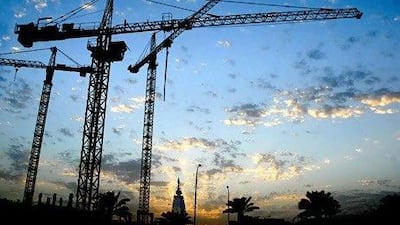Saudi construction costs are set to spiral as a government ban on cement exports has failed to keep a lid on prices.
The rising price of building materials could increase the cost of new homes and hit a slew of major infrastructure projects planned as part of a US$130 billion (Dh477.5bn) public spending plan.
Al Jouf Cement, a Saudi maker of the building materials, yesterday raised domestic price 30 per cent. Analysts say a continuing dispute between producers and Saudi Aramco could mean prices will continue to rise. Al Jouf increased its cement price to 260 riyals a tonne after the government's decision last week to halt the export of any domestically produced cement because of a shortage of the material in the Western region around Jeddah and the holy cities of Mecca and Medina.
Although domestic cement supply is expected to increase because of the export ban, the plan could be scuppered by moves by Saudi Aramco to limit fuel supplies to cement producers - a move that is expected to hurt production.
"In the last two to three months, prices have gone up about 20 per cent year-on-year," said Farouk Miah, an analyst at NCB Capital. "Aramco is refusing to give extra fuel for cement plants, and the cement companies are concerned that a lot of supply is supposed to be coming up. If and when Aramco gives this fuel, it will ease the bottleneck."
Aramco has demanded cement makers use their current supplies more efficiently. The oil company can sell crude at a much higher price on the global market. Saudi Aramco was unavailable for comment yesterday.
Demand for cement and other building materials is booming across Saudi Arabia as the government invests billions of riyals in huge infrastructure projects to build schools, hospitals and housing in order to create jobs.
Commercial organisations are also investing heavily, with Kingdom Holding last year signing a 4.6bn-riyal (Dh4.5bn) deal with Saudi Binladen Group to build the world's tallest tower in Jeddah.
But the cost of building these projects is now under threat as Saudi Aramco withholds fuel, and experts say there is a mismatch between supply and demand in the Western and Eastern provinces.
"The fact that prices have gone up does not immediately mean the increase will be passed on to the customer," said Nick Smith, a partner at EC Harris, a consultancy. "But as the market gets busier, then those increased charges will be passed on to the customer and that will change things. There will also be increased demand for contractors and resources from Qatar."
NCB expects total cement demand of 52 million tonnes this year against current capacity of 51 million tonnes, with an expected additional increase of 4.5 million tonnes.
The increased demand has also caused transport companies and cement distributors in the middle of the chain to increase their prices to their customers, analysts said.
"If there's lack of supply in new houses being built [because of increased cement prices], it could cause rising pressure and prices for existing units," said Mr Miah.
Prices for new homes in Jeddah have risen 10 per cent this month because of the higher cost of cement, the newspaperAl Eqtisadiahreported this month.
Cement production from 13 companies in Saudi Arabia grew 23 per cent to 4.8 million tonnes last month from January last year, according to data posted on the website of Yamamah Saudi Cement. Al Jouf shares had fallen 0.3 per cent to 16.70 riyals at close of trading yesterday.
Listed Saudi cement producers had previously reported strong fourth-quarter earnings on higher output and prices. Qassim Cement posted a 29.7 per cent increase in fourth-quarter profit to 145m riyals compared with a year earlier, Yanbu Cement's profit jumped 54 per cent to 153m riyals and Southern Province Cement increased earnings by 52 per cent to 251m riyals.
twitter: Follow our breaking business news and retweet to your followers. Follow us

